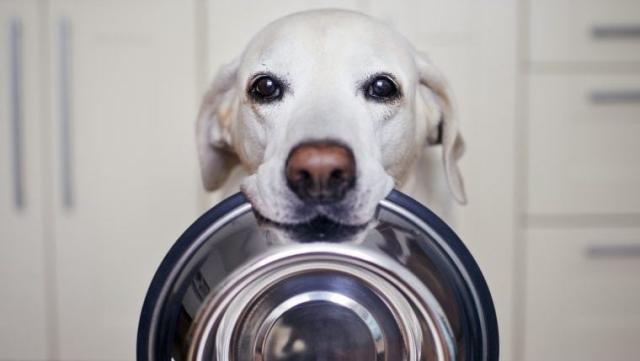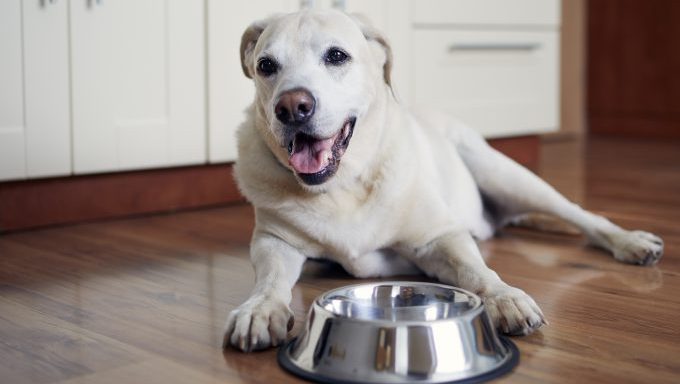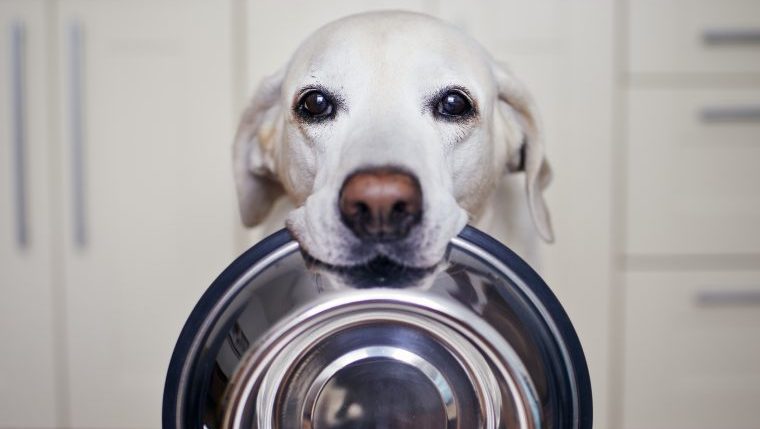If your dog is always hungry, it could be because of genetic factors, excessive exercise, health issues like diabetes or worms, medication side effects, stress, boredom, or improper nutrition. Dogs may eat more as they age due to underlying health conditions or medications.
To reduce your dog’s hunger, confirm the correct serving size, increase fiber intake, feed more frequently, distract your dog, limit treats, and try interactive feeding. Extreme hunger can also be a sign of medical conditions such as diabetes or hyperthyroidism.
Consult a healthcare provider for appropriate diagnosis and treatment.
Possible Reasons For A Dog’s Constant Hunger
Does your dog always seem to be hungry? There could be several reasons behind this constant hunger, such as genetic factors, excessive exercise, health issues, medication side effects, stress or boredom, or an inadequate diet. It’s important to address these factors and consult with your vet to ensure your dog’s health and well-being.
Genetics
Genetics can play a significant role in a dog’s constant hunger. Some breeds have a genetic predisposition to being food-driven and always feeling hungry. For example, Labradors are known to be voracious eaters due to their genetics. If your dog belongs to a breed with a high food drive, it’s important to monitor their diet closely and provide appropriate portion control.
Exercise
Regular exercise is crucial for maintaining a healthy weight and appetite in dogs. Insufficient exercise can lead to excess energy and boredom, which may manifest as constant hunger. By ensuring your dog gets enough physical activity and mental stimulation, you can help regulate their appetite and prevent them from constantly feeling hungry.
Health Issues
Some health conditions can cause dogs to be constantly hungry. Diseases such as diabetes, hyperthyroidism, and Cushing’s disease can disrupt a dog’s metabolism, resulting in increased appetite. If you suspect a health issue is causing your dog’s constant hunger, it’s essential to consult with a veterinarian to diagnose and address the underlying problem.
Medication Side-effects
Certain medications can have appetite-stimulating side-effects in dogs. For example, corticosteroids like prednisone commonly prescribed for allergies or autoimmune disorders can increase hunger. If your dog’s constant hunger coincides with starting or changing medication, discuss the side-effects with your veterinarian to determine if an alternative treatment option is possible.
Stress And Boredom
Stress and boredom can also contribute to a dog’s constant hunger. Just like humans, dogs may turn to food for comfort or as a form of entertainment. If your dog is experiencing stress or boredom, finding ways to alleviate these emotions through mental and physical stimulation, such as puzzle toys, interactive play, and regular training sessions, can help reduce their excessive appetite.

Credit: www.yahoo.com
Health Conditions That Can Cause Excessive Hunger
5 Reasons Why Your Dog Is Always Hungry: Genetic predisposition, excessive exercise, underlying health conditions (such as diabetes or worms), medication side-effects, or boredom with their food choices can all contribute to your dog’s constant hunger.
If your dog is always hungry, it could be a sign of an underlying health condition. Here are four common health conditions that can cause excessive hunger in dogs:Diabetes
Diabetes is a condition that affects dogs, just like humans. When a dog has diabetes, their body either doesn’t produce enough insulin or doesn’t effectively use the insulin it does produce. This leads to high blood sugar levels, which can cause increased hunger and thirst in dogs. Some common signs of diabetes in dogs include excessive thirst, frequent urination, unexplained weight loss, and increased appetite. If you suspect your dog has diabetes, it’s important to consult with your veterinarian for a proper diagnosis and treatment plan.Hyperthyroidism
Hyperthyroidism is a condition that occurs when the thyroid gland in the dog’s neck produces too much thyroxine hormone. This can cause the dog’s metabolism to speed up, leading to an increased appetite. Other symptoms of hyperthyroidism in dogs include weight loss, increased thirst, restlessness, and a rapid heart rate. If you notice these symptoms in your dog, it’s important to consult with your veterinarian for a proper diagnosis and treatment.Atypical Depression
Atypical depression is a condition that can affect dogs and cause excessive hunger. This type of depression is characterized by increased appetite, weight gain, and lethargy. Dogs with atypical depression may also exhibit symptoms such as low energy, irritability, and difficulty sleeping. If you suspect your dog is experiencing atypical depression, it’s important to consult with your veterinarian or a veterinary behaviorist for an accurate diagnosis and treatment plan.Epi (exocrine Pancreatic Insufficiency)
EPI is a condition that affects the pancreas and can cause dogs to be constantly hungry. The pancreas is responsible for producing digestive enzymes that help break down food. When a dog has EPI, their pancreas doesn’t produce enough of these enzymes, leading to poor digestion and malabsorption of nutrients. Some common signs of EPI in dogs include weight loss, excessive hunger, diarrhea, and dull coat. If you suspect your dog has EPI, it’s important to consult with your veterinarian for proper diagnosis and treatment. In conclusion, if your dog is always hungry, it may be due to underlying health conditions such as diabetes, hyperthyroidism, atypical depression, or EPI. It’s essential to consult with your veterinarian for proper diagnosis and treatment to ensure your furry friend’s health and well-being.Ways To Reduce A Dog’s Hunger
Discover 5 reasons why your dog is always hungry and explore 6 effective ways to reduce their hunger. From ensuring the correct serving size to increasing fiber intake and finding interactive feeding solutions, these tips will help curb your dog’s insatiable appetite.
Adjusting serving size
One way to reduce your dog’s hunger is by adjusting their serving size. Ensure that you are feeding them an appropriate amount of food based on their size and activity level. Consulting with a veterinarian can help determine the right serving size for your furry friend. Be sure to follow the recommended guidelines on the dog food packaging as a starting point, as these often provide general recommendations.
Increasing fiber intake
Another effective way to curb your dog’s hunger is by increasing their fiber intake. Incorporating fiber-rich foods into their diet, such as vegetables or grains, can help them feel more satisfied. Additionally, there are fiber supplements available that can be added to their meals. Remember to introduce any changes to their diet gradually to avoid any digestive upset.
Feeding frequency
Adjusting the frequency of your dog’s meals can also help reduce their hunger. Instead of feeding them two larger meals a day, consider splitting their daily food portion into smaller, more frequent meals. This can help regulate their blood sugar levels and prevent them from feeling excessively hungry between meals.
Distracting the dog
If your dog is constantly begging for food, distracting them can help redirect their attention away from their hunger. Engage them in mentally stimulating activities, such as playing with interactive toys or going for a walk. This can help alleviate their restless behavior and reduce their focus on food.
Cutting back on treats
Treats can contribute to your dog’s constant hunger, as they often contain high amounts of calories. Limit their treat intake to only a few pieces a day, and opt for healthier alternatives such as carrot sticks or air-popped popcorn. Additionally, make sure everyone in your household is aware of the importance of not giving excessive treats to the dog.
Using interactive feeding methods
Interactive feeding methods can slow down your dog’s eating pace and make them feel fuller for longer. Consider using puzzle feeders or food-dispensing toys that require your dog to work for their food. These interactive feeding methods can stimulate their mental and physical abilities while also extending their mealtime.
By implementing these ways to reduce a dog’s hunger, you can help manage their food cravings and ensure they maintain a healthy weight. Remember, always consult with a veterinarian before making any significant changes to your dog’s diet.

Credit: dogtime.com
Potential Medical Causes Of Polyphagia In Dogs
When it comes to dogs, a healthy appetite is quite normal. However, if your furry friend seems to be constantly on the hunt for food, it may be a sign of a larger issue. Polyphagia, or excessive hunger, can have potential medical causes in dogs. In this section, we’ll explore some of the common medical conditions that can lead to this insatiable appetite in our canine companions.
Diabetes
Diabetes is a condition that affects dogs just like it affects humans. Dogs with diabetes struggle to regulate their blood sugar levels, which can result in increased hunger. The body’s inability to properly utilize glucose leads to a constant feeling of hunger in our four-legged friends. Other symptoms of diabetes in dogs include increased thirst, weight loss, and frequent urination. If you suspect your dog may have diabetes, it’s important to consult with a veterinarian for proper diagnosis and management.
Cushing’s Disease
Cushing’s disease, also known as hyperadrenocorticism, occurs when the adrenal glands produce an excessive amount of cortisol. This condition can lead to symptoms such as increased appetite and weight gain. Dogs with Cushing’s disease may also experience hair loss, lethargy, and frequent urination. If you notice these signs in your dog, it’s crucial to seek veterinary attention for proper diagnosis and treatment.
Tumors
Tumors can also be a potential cause of polyphagia in dogs. These abnormal growths can affect the body’s normal functioning, including appetite regulation. Tumors in the brain or gastrointestinal tract can disrupt the signals that control hunger and satiety, leading to constant hunger in dogs. If you suspect that your dog may have a tumor, it’s essential to consult with a veterinarian to determine the best course of action.
Gastrointestinal Issues
Various gastrointestinal issues, such as inflammatory bowel disease or intestinal parasites, can contribute to excessive hunger in dogs. These conditions can affect the absorption of nutrients, leading to increased appetite as the body tries to compensate for the lack of nutrients. Dogs with gastrointestinal issues may also experience symptoms such as diarrhea, vomiting, and weight loss. If you suspect your dog may be dealing with these issues, it’s important to consult with a veterinarian for proper diagnosis and treatment.
Addressing Anxiety And Insecurity To Curb Hunger
Discover the 5 reasons why your dog is always hungry, from genetic factors to health issues. Learn how to address anxiety and insecurity to curb their constant hunger.
Is your dog constantly begging for food, acting like they’re always hungry? It could be a sign of anxiety and insecurity. Just like humans, dogs can experience stress and emotional turmoil that can manifest as increased appetite. Addressing these underlying issues can help curb their hunger and promote overall well-being. Let’s explore two effective strategies for managing stress and creating a secure environment for your furry friend.
Managing Stress
Stress can impact dogs in many ways, including their appetite. If your dog is feeling anxious, they may turn to food for comfort. To manage stress effectively, consider the following strategies:
- Provide regular exercise: Engaging in physical activity helps release endorphins and reduce stress levels in dogs. Aim for daily walks or playtime to keep them mentally and physically stimulated.
- Establish a routine: Dogs thrive on routine and stability. Ensure they have a consistent feeding schedule and stick to it. This will help alleviate feelings of uncertainty and create a sense of security.
- Create a calm environment: Reduce loud noises, busy environments, and other potential stress triggers in your dog’s surroundings. Provide a quiet space for relaxation and ensure they have a comfortable bed or crate to retreat to when needed.
Creating A Secure Environment
Promoting a sense of security is essential to help your dog feel emotionally balanced and reduce their constant hunger. Here are some steps you can take to create a secure environment for your four-legged companion:
- Provide mental stimulation: Engage your dog in interactive games and puzzle toys to keep their mind occupied. This helps distract them from food-related thoughts and redirects their focus to other enriching activities.
- Offer emotional support: Spend quality time with your dog, offering plenty of affection and reassurance. This helps build their confidence and strengthens the bond between you, helping them feel secure and loved.
- Consult with a professional: If your dog’s constant hunger persists despite your efforts, consider seeking guidance from a professional dog behaviorist or veterinarian. They can assess your dog’s specific needs and provide tailored advice to address their anxiety and insecurity.
By managing stress and creating a secure environment, you can help curb your dog’s constant hunger and promote their overall well-being. Remember, it’s essential to address the underlying emotional issues that may drive their increased appetite. With patience and proper care, you can ensure your furry friend feels safe, content, and satisfied.

Credit: dogtime.com
Frequently Asked Questions On 5 Reasons Why Your Dog Is Always Hungry
Why Is My Dog So Hungry All The Time?
Dogs can be hungry for various reasons including genetics, exercise, health issues, medication side effects, stress, boredom, or improper food. Consider feeding them the right type and amount of food, increasing fiber intake, managing feeding frequency, and reducing treats to curb their appetite.
It is also advisable to consult a healthcare provider if hunger persists.
Do Dogs Get Hungrier As They Age?
Yes, dogs can get hungrier as they age due to underlying health conditions or medication they may be taking. To reduce their hunger, try adjusting their serving size, increasing their fiber intake, feeding more frequently, providing distractions, cutting back on treats, and using interactive feeding methods.
How Can I Reduce My Dogs Hunger?
To reduce your dog’s hunger, try these six methods: 1. Make sure you’re feeding them the correct portion size. 2. Increase their fiber intake to help them feel fuller. 3. Feed them more frequently throughout the day. 4. Distract them with toys or activities to take their mind off food.
5. Cut back on treats to avoid overfeeding. 6. Use interactive feeding methods to slow down their eating.
What Disease Causes Hunger?
Polyphagia (hyperphagia) is a disease that causes extreme hunger. It is commonly associated with diabetes but can also be caused by other medical conditions such as hyperthyroidism and atypical depression. It is important to seek medical attention if experiencing polyphagia.
Conclusion
Ays hungry could be due to certain health issues or medication side effects. It’s important to stay vigilant and watch for signs of diabetes, worms, or other underlying conditions. Additionally, boredom or stress can also lead to constant hunger in dogs.
To address this, try increasing their fiber intake, feeding frequency, and utilizing interactive feeding methods. Remember to consult with your veterinarian to rule out any potential medical concerns and ensure your dog is getting the proper nutrition they need. By understanding the reasons behind your dog’s constant hunger, you can take the necessary steps to keep them healthy and satisfied.







